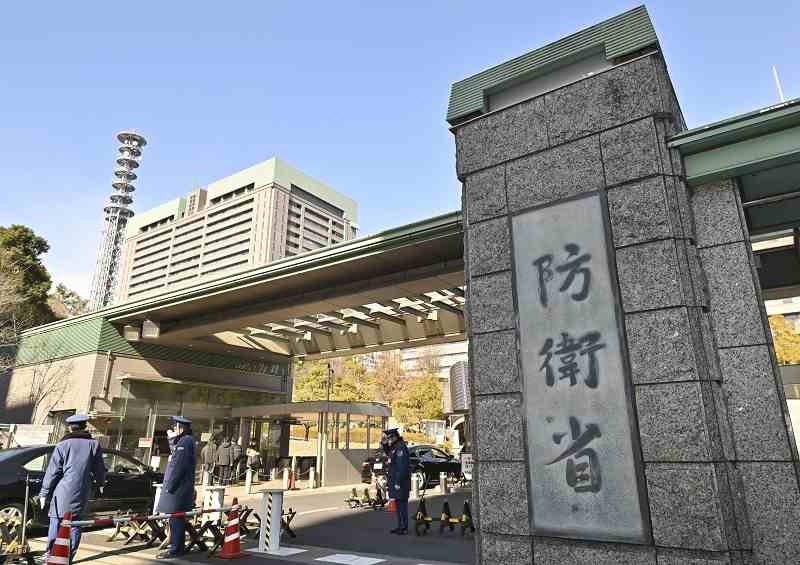Japan’s security draft declares Taiwan’s peace, stability vital for global community

The main gate of the Defense Ministry is seen in Shinjuku Ward, Tokyo.
21:00 JST, December 10, 2022
“Peace and stability across the Taiwan Strait are indispensable for peace, stability, and prosperity of the international community,” states the draft revision of the National Security Strategy the government plans to have approved this month, The Yomiuri Shimbun has learned.
The draft describes the security environment surrounding Japan as “the harshest and the most complicated in the postwar years,” and emphasizes that “a free and open international order is vitally important.”
The National Security Strategy is the basic plan of action for Japan’s foreign and security policies. The current document was formulated in December 2013. The ruling coalition of the Liberal Democratic Party and Komeito are in the final phase of discussing the revision. The government is expected to approve it with a Cabinet decision as early as Dec. 16.
The draft was presented to the ruling parties on Friday, together with the draft revisions of the national defense strategy (presently called the National Defense Program Guidelines) and the defense capacity development plan (currently the Medium Term Defense Program).
Amid Beijing’s increasing military intimidation of Taipei, the draft states that Taiwan is “an extremely important partner and friend with whom our country shares fundamental values.”
The draft makes clear Japan’s involvement in cross-strait relations between China and Taiwan by stating that Japan will “continue its efforts to deal with them based on the position that the related issues should be resolved peacefully.”
Regarding the international situation, the security strategy draft has warned that, in light of the moves taken by China and Russia, “movements challenging the international order have been accelerating.”
As to China’s moves, the draft has put it as “the greatest strategic challenge ever faced.” It cited China’s attempts to unilaterally change the status quo by force in the East and South China Seas, and the fact that China has not ruled out the possibility of using military force to realize reunification with Taiwan.
The draft has also included the idea of Japan possessing counterattack capabilities and adopting active cyber defense to prevent serious cyberattacks on Japan from occurring. It has also set up a section on economic security, emphasizing the need for reinforcing the nation’s supply chains, for instance.
The draft revision of the National Defense Strategy has defined counterattack capabilities as “the minimum necessary self-defense measures deemed unavoidable to prevent an attack.”
In the draft of the Defense Capacity Development Plan, the breakdown of the defense expenditures totaling approximately ¥43 trillion over the five-year period beginning in FY2023 is explained. Of the total, about ¥5 trillion will be allocated for building a “standoff defense capability,” which will enable the country to launch missiles from outside the range of an opponent and will constitute the key to counterattack capability for self-defense.
About ¥15 trillion will be allocated to ensure “sustainability and resilience” to improve the ability to sustain defense operations. Of this amount, about ¥9 trillion will be set aside for the maintenance of equipment and the ensuring of its mobility.
Top Articles in Politics
-

Japan Tourism Agency Calls for Strengthening Measures Against Overtourism
-

LDP Wins Historic Landslide Victory
-

Japan’s Prime Minister: 2-Year Tax Cut on Food Possible Without Issuing Bonds
-

Voters Using AI to Choose Candidates in Japan’s Upcoming General Election; ChatGPT, Other AI Services Found Providing Incorrect Information
-

LDP Wins Landslide Victory, Secures Single-party Majority; Ruling Coalition with JIP Poised to Secure Over 300 seats (UPDATE 1)
JN ACCESS RANKING
-

Japan Institute to Use Domestic Commercial Optical Lattice Clock to Set Japan Standard Time
-

China Eyes Rare Earth Foothold in Malaysia to Maintain Dominance, Counter Japan, U.S.
-

Man Infected with Measles May Have Come in Contact with Many People in Tokyo, Went to Store, Restaurant Around When Symptoms Emerged
-

Japan, Qatar Ministers Agree on Need for Stable Energy Supplies; Motegi, Qatari Prime Minister Al-Thani Affirm Commitment to Cooperation
-

Australian Woman Dies After Mishap on Ski Lift in Nagano Prefecture
























